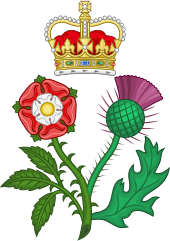House of Commons of Great Britain
| The Honourable the Commons of the Kingdom of Great Britain in Parliament assembled | |
|---|---|
|
Royal coat of arms of Great Britain, 1714-1800 | |
| Type | |
| Type | |
| History | |
| Established | 1 May 1707 |
| Disbanded | 31 December 1800 |
| Preceded by |
House of Commons of England Third Estate of the Parliament of Scotland |
| Succeeded by | House of Commons of the United Kingdom |
| Leadership | |
|
Henry Addington Since 1789 | |
| Seats | 558 |
| Elections | |
| First past the post with limited suffrage | |
| Meeting place | |
| St Stephen's Chapel, Palace of Westminster, Westminster, London | |
| Footnotes | |
|
See also: Irish House of Commons | |
The House of Commons of Great Britain was the lower house of the Parliament of Great Britain between 1707 and 1801. In 1707, as a result of the Acts of Union of that year, it replaced the House of Commons of England and the third estate of the Parliament of Scotland, as one of the most significant changes brought about by the Union of the kingdoms of England and Scotland into the Kingdom of Great Britain.
.jpg)
In the course of the 18th century, the office of Prime Minister developed. The notion that a government remains in power only as long as it retains the support of Parliament also evolved, leading to the first ever motion of no confidence, when Lord North's government failed to end the American Revolution. The modern notion that only the support of the House of Commons is necessary for a government to survive, however, was of later development. Similarly, the custom that the Prime Minister is always a Member of the Lower House, rather than the Upper one, did not evolve until the twentieth century.
The business of the house was controlled by an elected Speaker. The Speaker's official role was to moderate debate, make rulings on procedure, announce the results of votes, and the like. The Speaker decided who may speak and had the powers to discipline members who break the procedures of the house. The Speaker often also represented the body in person, as the voice of the body in ceremonial and some other situations. The title was first recorded in 1377 to describe the role of Thomas de Hungerford in the Parliament of England. By convention, Speakers are normally addressed in Parliament as Mister Speaker, if a man, or Madam Speaker, if a woman.
In 1801, the House was enlarged to become the House of Commons of the United Kingdom, as a result of the Act of Union of 1800 which combined Great Britain and the Kingdom of Ireland into the United Kingdom of Great Britain and Ireland.[1]
Creation
The members of the last House of Commons of England had been elected between 7 May and 6 June 1705, and from 1707 they all continued to sit as members of the new House of Commons. The last general election in Scotland had been held in the autumn of 1702, and from 1707 only forty-five of the members of the Parliament of Scotland joined the new house. In Scotland there was also no new election from the burghs, and the places available were filled by co-option from the last Parliament.
Parliamentary constituencies
The constituencies which elected members in England and Wales remained unchanged throughout the existence of the Parliament of Great Britain.[1]
- Table of Constituencies and Members of the Parliament
| Country | BC | CC | UC | Total C | BM | CM | UM | Total Members |
|---|---|---|---|---|---|---|---|---|
| England[2] | 203 | 40 | 2 | 245 | 405 | 80 | 4 | 489 |
| Wales[2] | 12 | 12 | 0 | 24 | 12 | 12 | 0 | 24 |
| Scotland | 15 | 30 | 0 | 45 | 15 | 30 | 0 | 45 |
| Total | 230 | 82 | 2 | 314 | 432 | 122 | 4 | 558 |
- Key: BC - Borough or Burgh constituencies, CC - County constituencies, UC - University constituencies, Total C - Total constituencies, BMP - Borough/Burgh Members of Parliament, CMP - County Members of Parliament, UMP - University Members of Parliament.
- Sources:
- Chris Cook & John Stevenson, British Historical Facts 1760-1830 (The Macmillan Press, 1980)
- Colin Rallings & Michael Thrasher, British Electoral Facts 1832-1999 (Ashgate Publishing Ltd, 2000)
See also
- Elections in Great Britain
- Unreformed House of Commons
- List of Parliaments of Great Britain
- 1st Parliament of Great Britain
- 2nd Parliament of Great Britain
- List of members of the 1st Parliament of Great Britain
- List of Speakers of the British House of Commons
References
- 1 2 Chris Cook & John Stevenson, British Historical Facts 1760-1830 (The Macmillan Press, 1980)
- 1 2 Monmouthshire, with one county constituency represented by two members and one single-member borough constituency, is included in England. In later centuries it was included in Wales.
Further reading
External links
Coordinates: 51°29′59.6″N 0°07′28.8″W / 51.499889°N 0.124667°W
.svg.png)
